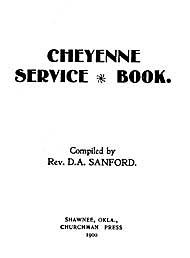| United States | England | Scotland | Ireland | Wales | Canada | World |
| |
The Book of Common Prayer | ||||||
|
|
| Cheyenne
is a Native American language of the Algonquian family spoken today by
about 1700 people mostly in Montana (Northern Cheyenne) but also in Oklahoma
(Southern Cheyenne).
The history of Cheyenne connections to the Episcopal Church is tied closely to the life of David Pendleton Oakerhater (c. 1850-1931) a Cheyenne warrior baptized in Syracuse, New York, in 1878, and ordained to the diaconate in 1881. He founded schools and missions in Oklahoma, working among his people until his death on 31 August 1931. He is commemorated in the Episcopal Church on 1 September. Pendleton assisted the Reverend David Augustus Sanford in the translation of this liturgical booklet, the only known Anglican text in Cheyenne. D. A. Sanford was graduated from the University of Wisconsin in 1875, and from the Philadelphia Divinity School in 1878. He served as a missionary to the Cheyenne and Arapahoe Indians at Bridgeport, Okla., from 1894-1907.
|
Thanks are due to Richard Mammana, who obtained and transcribed the text.
|
CHEYENNE
Compiled by
|
 |
| Ahän aists-nehoo hamähayunnä-istsimhiyun;
netäo hoe hagotomätone. Hab. 2:20. Napävatän, tsahatäis ’sstäis-nivom himhiyon Ahän. Ps. 122:1 Nätäohäe nä nätänhoh?tsivo neoha, nä nätätsitto: Neho, nätävsivoatä hanäässists haäma nä etow. St. Luke 15:18. Häoenätow Ahän tsyhpävä dämänots tsissäädonsohanaits; netä hoe tsyh?naits däsinnaehow. Ps. 96:9. CONFESSION. Tsahotänäist nä tsishevätämäits Ahän, nemayo nenohayoohim, Däämä neämetänow; Nesää-ähtohenun hemäh˙histoemänistuts; ih˙ hämä evänu dänuwoh nä hatu tsayoto-saih˙hänunst, nä hatu tsissäävinhesheveists; nä emissää epavä moh˙tiis; nä etatu Ahän nishevätämääne, tseoh˙sheyo oh˙toatästow; tseishsäävish vehoissänes Mähamähayo, tsaavä-momoh˙tse-nätänuh˙-tow tseoh˙toatästow; Oosaish hoaavätämenän tsepävä pävinhishenän wostäne-tsishevätäm tseto Tsenetästs Jesus Nemähayunnämän. Tsemittäits shevätämähistuts Ahän, tsevisheavhits, pävoom, tsishpävätämänoits havahistof. Amen. Net-häoenäm. THE LORD’S PRAYER. Ahän haäma tsahistit, tsemähayunnädämits nevahistots, nenetästowä tsemänohoenon, neoh˙chetänoh˙totots nessone tsithoevä, häpo haäma tsehiss, Hatsishava neh˙mitsimino oishavä nähtämän, Wonänomivi-mino nätä-havsivoiatästonänots, häpo tsehish-wonänomossänits tseoh˙che hätävsivoaotsee, Nevi-wonoä-owimino hävsivivä otä wostäniv-shimino hävsivstui, Tsehish-histsowitto ohätamähistots, vehonstänivistots nä wohoh˙yo evätämäistots, äinitto. Amen. VERSICLES. M. Ahän, tätäin nätsinnänuts. |
|
VENITE (from Psalm 95.)
1. Nenäes, nechisheäsinooton Ahän: nä tsetsestähän tsewoishedänom tsyh˙egonäes
tsivostänivhits. BONUM EST. 1. Tsyhpävä tsemittäits hähoä Ahän: tsyh˙pävä äsinoanisto
havehistots tsyh˙häoahuist. APOSTLES’ CREED. Näonisseyomätän Mähamäh˙ayo Ahän, Tsaah˙pä-ohätämäs-ts, Tsyhmänits
haäma nä hoe. Nä Jesus Christ Hanoko-anoh˙tsitto Tsyh˙mähavitshofs,
tsyh˙nistämähayunnäveyos Mähayunnämättäsoomäiva, tsyh˙istäuts tsehaha-ahavst
Mary havä, tsyh˙momits-stowoaas Pontius Pilate, tsetsehois, tsyh˙näes,
tseäh˙tohos, chaänhuns-hähtono-oma, tsenää-onittots ish haavähihu tsyh˙näes,
aavhä-ämioh˙tseho haämä, ahämstoehu mätseämähist Mäh˙amähayo Ahän Tsaah˙pä-ohätämäs-ts.
Haämä tsynstosse onisseyomhavhassoins tsinsto-so-hoemäovs tsämitäneniss
tsemehäishenätsis. COLLECT. Tsahotoänäist Ahän, nestätsaist stäh˙anuts ayunstänänuts, nestätsaist
ahinneinänuts tsahetohiwots, ahavitsof howähe nimesäänooistomewohenän,
tsepävetänuts ’sstähan tsevisheyomatommits Mähayunnämättäsoomä nätäto
netä-mehotäin nehissemänhäowän täis-nino-hevahinnun, nesoh˙-payuts-hiun
Tseyäanäits Christ. Amen. |
|
COMMANDMENTS.
Nä aistseho Mähamähayo netäo hato aistsistotots, nä istse-sheists: Näneahof Tsenetätto Nemähayunnämetof: 1. Tsenetässo mähayunno nstseve-mähayo-nämenots netove.
1. Tsenetästs nähane-atämistowinots, howähe nätsää-hoehätsto. Hear what Our Lord Jesus Christ saith: Aätoh˙ Nemähayunnämän Jesus Christ tsahais: Mehotäts Nemähayunnämän Mäh˙amähayo avissewotänuts nestätshaist stäh˙äwots, nä ämät avissewotänots nestätshaists newostänihivistoewots nä ämät avissewotänuts nestätshaist shetänuh˙towewots. Hato wowoenut mäh˙hoemänistuts. Nä ämät neshonäow; Mehotäts hapo tseshish mehotätsetoh˙. Nä hato neh˙ hamäh-histoemänistuts. |
| Web author: Charles Wohlers | U. S. • England • Scotland • Ireland • Wales • Canada • World |